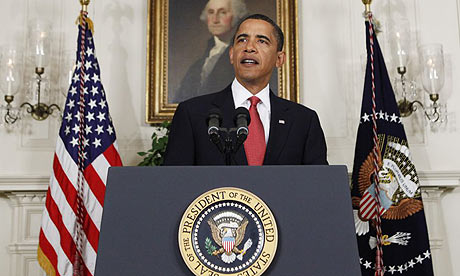
Republicans have condemned Barack Obama's decision to scrap a US missile defence shield in Europe as a policy of appeasement that will embolden Russia and Iran while letting down America's allies.
Obama's decision means the US will not now base US interceptor missiles in Poland and radar in the Czech Republic to protect Europe from Iranian missiles. Russia had denounced the defence system as a threat to its own defences and demanded that it be scrapped.
"Scrapping the US missile defence system in Poland and the Czech Republic does little more than empower Russia and Iran at the expense of our allies in Europe," the leader of the Republicans in the House of Representatives, John Boehner, told Fox News.
Lindsey Graham, the Republican senator for South Carolina, said: "It will empower the Russians and it will scare the crap out of the Poles, Czechs, Ukrainians and Georgians. It is a huge mistake."
Jon Kyl, Republican senator for Arizona, called Obama's decision "dangerous and short-sighted". In a statement, Kyl, the Senate minority whip, said: "Not only does this decision leave America vulnerable to the growing Iranian long-range missile threat, it also turns back the clock to the days of the cold war, when eastern Europe was considered the domain of Russia.
"This will be a bitter disappointment, indeed, even a warning to the people of eastern Europe. The message the administration sends today is clear: the United States will not stand behind its friends and views 'resetting' relations with Russia more important."
John McCain warned that the decision to scrap the missile shield came at a time when loyal US allies in eastern Europe were "increasingly wary of renewed Russian adventurism".
The former presidential candidate, who is senator for Arizona, said: "Given the strong and enduring relationships we have forged with the region's nations since the end of the cold war, we should not, I believe, take steps backward in strengthening these ties."
In a comment piece for the Washington Post, David Kramer, the former deputy assistant secretary of state responsible for Russia, Ukraine, Belarus and Moldova in the Bush administration, described Obama's move as a "capitulation to Russian pressure" and "a serious betrayal of loyal allies in Warsaw and Prague".
The partisan uproar came despite the endorsement of the move by Robert Gates, the defence secretary, who also served under George Bush and previously supported the missile shield.
Gates said that a new system spread across various countries would provide "a better missile defence capability for our forces in Europe, for our European allies and eventually for our homeland than the programme I recommended almost three years ago."
Democrats have praised the decision, with Carl Levin, the Senate armed services committee chairman, calling it "a sound choice that will improve our security", according to USA Today.
Philip Coyle, former Pentagon testing chief, said: "What the president is proposing here actually produces more defence sooner than the programme it replaces."
An editorial in the New York Times also backed Obama's plan, noting that the technology required for the Bush administration's missile shield "was nowhere near ready" and "the threat it was supposed to defend against – an Iranian intercontinental ballistic missile – was also years away".
But it warned that the president would need a very deft hand to manage the diplomatic fallout of his decision, to both placate the disappointment of the Polish and Czech governments and ensure that Moscow behaves.
0 comments:
Post a Comment